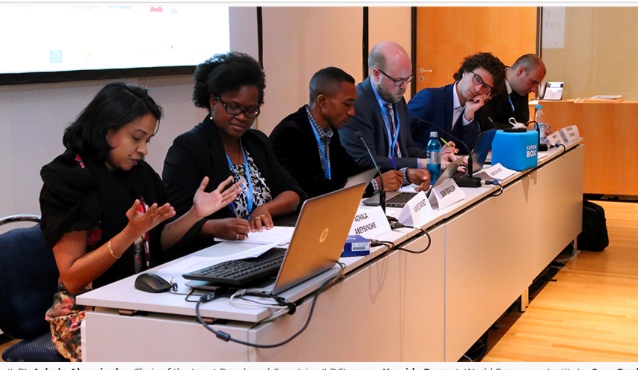
PAMACC News in Bonn, Germany
Non-party stakeholders across the globe working to fight climate change in different countries have called on governments to use the climate talks in Bonn to pick up from the ashes in Marrakech and push for progress in the implementation of the Paris Agreement.
Non-party actors like the Pan African Climate Justice Alliance (PACJA) Climate Action Network (CAN) and other prominent civil society groups have added their voice to that of other development actors, to see the Paris Agreement make significant progress that brings measured hope and pointed actions.
At a side event focused on ensuring robust transparency mechanism in the implementation of the Paris Agreement Framework, PACJA’s Sam Ogallah emphasised on the need to leverage the expertise of Non-Party stakeholders to better ensure transparency.
Offering reasons for African support of transparency, Sam Ogallah cited a history of double-counting and mistrust; the special circumstances of developing countries which require international support to implement Nationally Determined Contributions (NDCs); and the need for accountability and transparency in the delivery of NDCs. “The Paris rulebook is key to effective implementation of NDCs in Africa,” he added.
Achala Abeysinghe, Chair, Least Developed Countries (LDC) Group, drew attention to the short time frame for negotiations on the Paris rulebook. Recognizing the key role that non-party stakeholders play, she identified three key processes they should support: expert review, national reporting and submission of relevant information to tackle barriers to implementation.
She emphasized that “the Paris Agreement is just an empty shell without the rulebook.”
To Sébastien Duyck, University of Lapland, the importance of the next 18 months for the design of the Paris rulebook cannot be over-emphasised. He highlighted potential roles for non-state actors in the transparency framework, including: enhancing trust among parties; strengthening the capacity to assess potential gaps; and providing incentives for parties to deliver on NDCs.
A press release from Climate Action Network France after day one opening of the United Nations Framework Convention on Climate Change,UNFCCC, Climate conference in Bonn-Germany, May 8 2017, highlights the expectations of civil society groups with emphasis on the need to move forward from the ashes of COP 22 in Marrakech.
Sven Harmeling, Climate Change Advocacy Coordinator at CARE International, emphasized that ”the urgency to get the Paris Agreement off the ground is crucial given that impacts from climate change are becoming more glaring with more droughts in Africa and heat waves in India.”
He said the scale of ambition has to be commensurate with the urgency that are seen from impacts. Speaking on the specifics of advancing work on implementation, he added. “We also need to see Parties at Bonn bring more clarity and progress on accounting modalities for climate finance which was a left-over issue from Marrakech.”
Brandon Wu, policy director from ActionAid US, highlighted that as uncertainty on the US’ position on the Paris Agreement continues, civil society groups urge the Trump administration to stay in the Agreement but it must also respect the spirit of the Agreement to meet the goals of Paris.
“Even at the current scenario we don’t meet the goals of keeping warming to 1.5 degrees celcius and any move to scale down ambition will definitely not meet this goal- which is what Paris is all about,” he added. There has been a remarkable push from Governors and Mayors to keep the US in the Agreement, he added.
Lucile Dufour, Climate Action Network France, spoke about the victory of Emmanuel Macron and the implications of this for climate action. “Although Macron didn’t make energy transition a priority during his campaign, he is unlikely to stop environment progress. Without a push from other leaders and civil society he will not increase ambition so we still have work ahead of us. He said France will keep the lead in global climate progress.
“If he is to do this he needs to adopt climate policies to increase international solidarity and domestic policies to raise ambition.”










